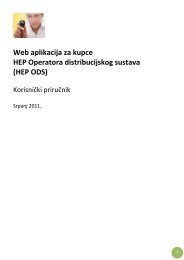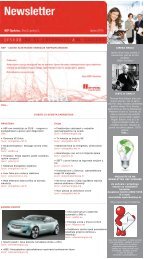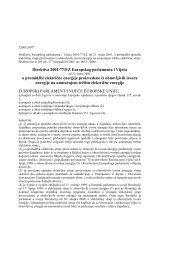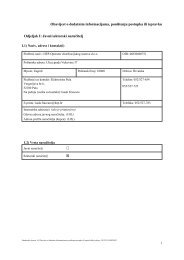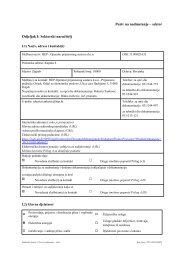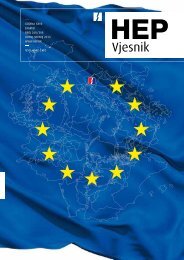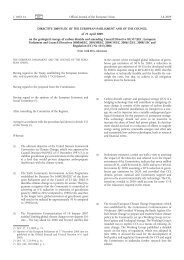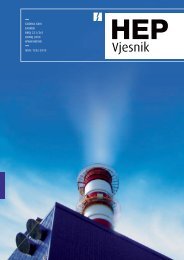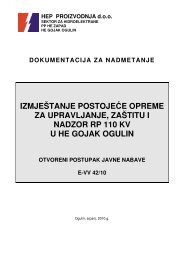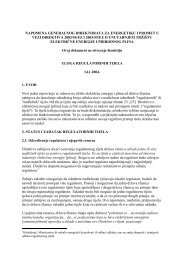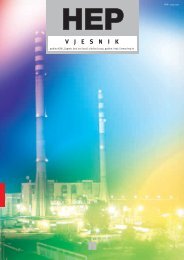You also want an ePaper? Increase the reach of your titles
YUMPU automatically turns print PDFs into web optimized ePapers that Google loves.
10 ZAKLJU»AK<br />
U ovom Ëlanku rijeË je o sadaπnjim nedostacima<br />
funkcioniranja træiπta unutar EU. Opisani su<br />
planovi EU za rjeπavanje pitanja sigurnosti<br />
opskrbe i zaπtite okoliπa i dan je kratak osvrt na<br />
koncept konkurentskog træiπta diljem EU.<br />
Nitko ne moæe predvidjeti u kojem Êe se opsegu<br />
razvijati konkurentsko træiπte, bilo u pojedinim<br />
zemljama ili prekograniËno, ili hoÊe li biti<br />
specifiËnih, neponovljivih regionalnih znaËajki.<br />
Moæda EU tek pokuπava postaviti okvirnu politiku<br />
unutar koje se træiπte moæe razvijati, ali bez jamstva<br />
da Êe se to i dogoditi. Svaka politika mora barem<br />
identificirati oËite prepreke na putu razvoja.<br />
Konkurentska træiπta, bez obzira o kojoj je robi<br />
rijeË, razvijaju se samo onda kada dva ili viπe<br />
gospodarskih subjekata vide moguÊnost da<br />
poboljπaju svoj poloæaj na træiπtu i da ostvare<br />
dobit bez pretjerana rizika, uz jasne propise koji<br />
πtite i njihove interese i interese njihovih kupaca.<br />
Operatori na tim træiπtima pametno uoËavaju gdje<br />
im leæe moguÊnosti i koje su mjere potrebne kako<br />
bi se one iskoristile. Obratno, nitko neÊe uÊi u<br />
neko træiπte suoËen s netransparentnim propisima<br />
i ukoliko se postojeÊa dominacija na træiπtu i drugi<br />
rizici doæivljavaju kao prekomjerni.<br />
Pokuπaji uvoappleenja stvarnog i transparentno konkurentskog<br />
træiπta elektriËne energije u Europi nisu<br />
bili djelotvorni zadnjih desetak godina, no sada se<br />
ulaæu novi napori. Usprkos opisanim preprekama<br />
oni bi mogli uspjeti na naËine koje joπ ne moæemo<br />
predvidjeti, no jedino ako budu prihvatljivi uvjeti<br />
za one koji se odluËe upustiti u træiπnu utakmicu.<br />
Te prepreke nastaju najviπe zbog træiπne koncentracije<br />
i nedjelotvorne regulative, zbog mehanizama<br />
Europskog programa trgovine emisijama te dvojbi<br />
oko toga moæe li se odgovarajuÊim tempom<br />
izgraditi dovoljno novih elektrana i prijenosnih<br />
spojnih vodova. Svi se ti problemi moraju rijeπiti<br />
ako se æeli razviti uËinkovito konkurentsko træiπte.<br />
U Ëlanku se opisuju konkretne znaËajke elektroprivrede<br />
u jugoistoËnoj Europi i specifiËni trendovi<br />
u Hrvatskoj gdje se naglasak stavlja na poboljπanje<br />
energetske uËinkovitosti i na jaËe poticanje<br />
uporabe obnovljivih izvora energije.<br />
Ne Ëini se vjerojatnim da Êe poveÊana regulativa<br />
i razdvajanje energetskih tvrtki biti dovoljni za<br />
poticanje jedinstvenog træiπta kakvom se nada<br />
Komisija EU.<br />
BuduÊnost neÊe biti ista kao proπlost ili sadaπnjost,<br />
niti prepreke na putu razvoja jedinstvenog træiπta<br />
10 CONCLUSION<br />
This paper has described the current market<br />
malfunctioning within the EU. It has described the<br />
EU’s plans to deal with the security of supply and<br />
protection of the environment, and touched on the<br />
concept of a system-wide competitive market.<br />
No one can tell to what extent the competitive<br />
market will develop either in individual countries or<br />
across the borders, or whether there will be regional<br />
characteristics not replicated elsewhere. Perhaps<br />
the EU is attempting only to set a framework policy<br />
within which a market may develop, but without any<br />
guarantee of its happening. Any policy must at least<br />
identify obvious barriers to development.<br />
Competitive markets in any commodity only develop<br />
when two or more entities see an opportunity to<br />
improve their market position and to make profit<br />
without undue risk, provided that there are clear<br />
regulations that safeguard both their interests<br />
and those of their customers. Those who operate<br />
these markets are ingenious in detecting where the<br />
opportunities lie and the steps necessary for their<br />
exploitation. Conversely, none will enter a market<br />
if they face awkward regulations and if the existing<br />
domination of that market and other risks are<br />
perceived as excessive.<br />
The attempts to introduce a real and transparently<br />
competitive market in electricity in Europe have<br />
been ineffective over the past 10 years but renewed<br />
efforts are now being made. Despite the obstacles<br />
described they may yet succeed in ways we cannot<br />
yet foresee, but only if the conditions are right for<br />
those choosing to compete.<br />
These obstacles arise principally from market concentration<br />
and inefficient regulation, the mechanisms<br />
of the European emissions trading scheme<br />
and doubts whether enough new generation plants<br />
and transmission interconnections can be built<br />
at the appropriate rate. All these problems must<br />
be solved if a competitive effective market is to<br />
develop.<br />
The paper describes the particular characteristics<br />
of the energy supply industry in south-eastern<br />
Europe and the specific developments in Croatia<br />
where emphasis lies on improvements in energy<br />
efficiency and enhanced promotion of renewable<br />
sources of energy.<br />
It seems unlikely that the setting-up of more<br />
regulation and the unbundling of energy companies<br />
will suffice to create the single market hoped for by<br />
the EU Commission.<br />
Kennedy, M. W., StaniÊ, Z., Energetska politika u Europi i..., Energija, god. 56(2007), br. 3., str. 268∑291<br />
Kennedy, M. W., StaniÊ, Z., Energy Policy in Europe and..., Energija, vol. 56(2007), No. 3, pp. 268∑291<br />
290



